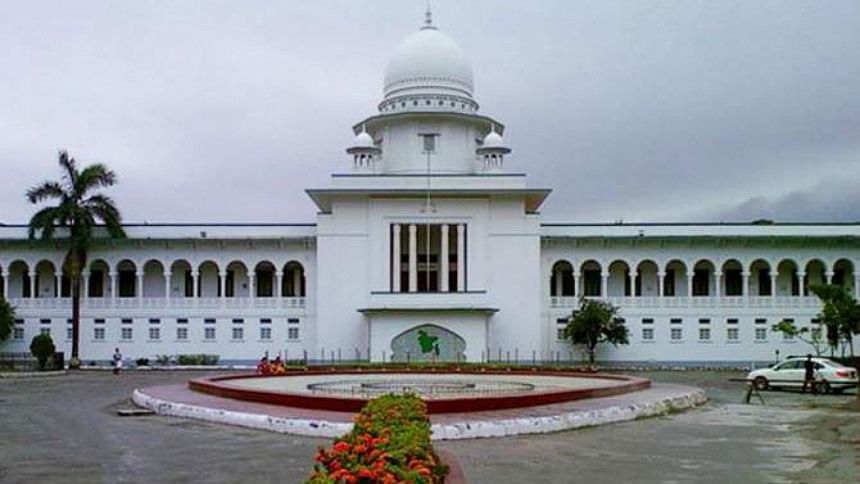Power to Remove SC Judges: Govt arguments fallacious: SC

If the parliament can impeach and remove the President, the Prime Minister, the Speaker and Deputy Speaker then why can't it remove Supreme Court judges? This is one of the main arguments the government and MPs have been making since 2014 to justify the 16th constitutional amendment. But the argument is based on false notion and premises, according to the SC verdict on the 16th amendment case.
The SC found no legal basis in support of the above argument and rejected the argument by terming it as "absolutely fallacious", "populistic and easy consumptive arguments."
The apex court said the President, the Speaker and the Deputy Speaker are elected by MPs. And the person who enjoys the support of the majority in parliament is appointed as the prime minister. That's why it is very natural that they remain answerable or accountable to the parliament. The constitution provides for their impeachment or removal by MPs.
But the SC judges are not elected by MPs and they are not even appointed by the parliament. In the present constitutional scheme, MPs have no say in any manner in the appointments of SC judges. They are appointed by the president, said the verdict.
It also said there are also fundamental differences between the duties of the office of the President, the Prime Minister, the Speaker and the Deputy Speaker and those of the SC judges.
The president and the prime minister are the executives and they do not adjudicate any dispute between the government and the citizens, between the citizens and the citizens and between the poor and the powerful, observed the court in further defence of rejecting the argument to allow the parliament to remove SC judges.
The 16th amendment made in September 2014 had restored the parliament's power to remove the SC judges on grounds of misconduct or incapacity by abolishing the chief justice led Supreme Judicial Council. The amendment was challenged with the High Court.
In May last year, the HC declared the amendment unconstitutional and void as it found the changes went against the principles of the separation of powers and the independence of the judiciary. The government appealed against the HC verdict but in July, the Appellate Division of the SC rejected the appeal and upheld the HC verdict.
Following cancellation of the 16th amendment, the Supreme Judicial Council was restored. Now, the President shall, by order, remove a SC judge from office if he is found guilty of gross misconduct in the inquiry to be carried out by SJC.
During the hearing of the appeal filed by the government against the HC verdict, the attorney general and his colleague had made the argument that parliament should have the power to remove SC judges as it can remove or impeach the president, the prime minister and the Speaker.
In the preamble of the 16th constitutional amendment bill placed in parliament in September 2014, the law minister himself made a similar argument.
"The argument that since the Judges are appointed by the President and since he (the President) can be impeached/removed by Parliament, the Judges are also to be made impeachable by Parliament is absolutely fallacious," said Justice Abdul Wahhab Miah.
Wahhab Miah, one of the seven judges of the Appellate Division of the SC, concurred with the decision made unanimously in dismissing the government appeal with observations. In addition, he expressed his own views about the matter.
According to the verdict, the attorney general and the additional attorney general also argued that "if the President, the Prime Minister and the Speaker could be impeached/removed by parliament why not the SC judges, are they too big, too great and too superior to the representatives of the people?"
Justice Wahhab Miah termed the argument as "populistic and easy consumptive."
The attorney general, in his written submission to the apex court, even said: “If some prospective candidate for the post of a Judge feels himself too big, too great, too superior to the representatives of the people they are not welcome to the judiciary, they may even quit.”
In response, Justice Wahhab Miah said in making the above submission the attorney general and the additional attorney general did not at all care to see the provisions of the constitution.
The attorney general even launched a verbal attack on former law minister Shafique Ahmed who placed in parliament the 14th constitutional amendment bill in 2011 which reinstated afresh in the constitution the Supreme Judicial Council.
"He was a technocrat Minister and he being a Senior Advocate 'wanted to give a good turn to the learned Judges of the Supreme Court, most of whom if not all of them, wouldn't like the idea of facing the House of the Nation, if such situation arises in future, even if at all' in not scrapping the Supreme Judicial Council in Fifteenth Amendment," alleged the attorney general.
In response, Justice Wahhab Miah said: "The submission of the learned Attorney General is absolutely unfortunate, shocking and disparaging for the Judges of the Supreme Court and bereft of factual basis as well inasmuch."
He said the constitution has guaranteed the independence of the judiciary, the SC judges being its stakeholders are independent and if the power of impeachment is given to parliament, it shall be in direct conflict with the provisions of articles 22, 94(4), 116A and 147(2) of the constitution and that shall in effect destroy the rule of law, another basic structure of the constitution.
Article 22 speaks for separation of judiciary from the executive. The articles 94(4), 116A guarantee that the judges of the SC and lower judiciary will be independent in exercise of their judicial functions.
According to article 147(2), the remuneration, privileges and other terms and conditions of a SC judge shall not be varied to the disadvantage of him during his term of office.
The constitution has not said anything about the independence of the other two organs--executive and legislature, said Justice Wahhab Miah.
The attorney general emphasised that our parliamentary system of government is based on the Westminster Parliament, where judges of the higher judiciary may be removed by Parliament.
In response, Justice Muhammad Imman Ali, another judge of the seven-member Appellate Division, said the situation in the UK cannot be equated with that prevailing here.
He said the British parliament was empowered by the Act of Settlement in 1701 to remove the judge only to protect the judges from the draconian and pernicious actions of the then Kings/Queens who could whimsically remove the judges. Since 1701, not a single English judge has been impeached by the parliament, he said.
He further stated: "Moreover, the system of appointment of judges in the UK and other countries referred by the learned Attorney General is not the same as the one operating in our country. Hence, there is no logic in wishing to follow those other countries."
Justice Mirza Hussain Haider, another judge of the Appellate Division, in the verdict said the disciplinary action of all service holders are taken by the department concerned after holding in-house inquiries by the same department to which he belongs not by any outsider. That is the general principle of law. The judiciary cannot be an exception, he said.
"Thus when the question of removal of any person holding a post of Supreme Court Judges' status arises, that should be and must be dealt with by such council [SJC] of their own people, of course higher in rank."

 For all latest news, follow The Daily Star's Google News channel.
For all latest news, follow The Daily Star's Google News channel. 







Comments